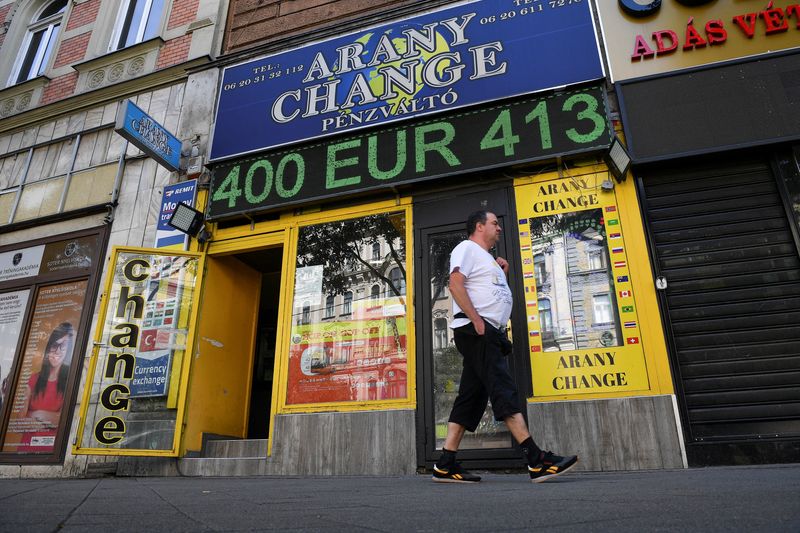By Gergely Szakacs
BUDAPEST (Reuters) - The Hungarian forint's slide following Russia's invasion of Ukraine is leading some Hungarians to embrace the euro instead of the local currency, which has lost more than half of its value since Prime Minister Viktor Orban took power in 2010.
Like fellow European Union members Poland, Czech Republic or Romania, Hungary is nowhere near adopting the single currency, with Orban's government ruling out in the foreseeable future a move it says would amount to a loss of economic policy sovereignty.
But the forint, which has been under pressure from Hungary's twin deficits and a standoff with Brussels over rule of law holding up EU funds, is the region's laggard this year again and some Hungarians are taking matters into their own hands.
An April Eurobarometer survey among countries not yet using the single currency showed support for adopting it was the highest in Hungary and neighbouring Romania, where euro payments have long been the norm in used car sales and home rentals.
Both the forint's 8% slide against the euro so far this year and its volatility highlighted by its nearly 4% move over two days earlier this month, boosted the euro's appeal even further, even though its use is still limited within the broader economy.
Shortly after Russia's invasion of Ukraine in late February, Laszlo Szucs, a lawyer at Reti, Varszegi & Partners Law Firm PwC Legal, started fielding more calls from corporate clients asking how they could compensate workers for the forint's declines.
He said most calls came from financial and business services firms and the manufacturing sector.
While workers and consumers elsewhere in European countries faced similar pressures from runaway energy and food prices, the weakening forint was an additional challenge.
As paying wages in euros outright is, with few exceptions, against the Hungarian law, most companies opted for extraordinary hikes worth 5-10%, while some offered end-of-quarter extra payments linked to the forint's moves, Szucs said.
The IT services sector, where many work as independent contractors and bill foreign clients in euros, switched almost entirely to euro-based contracts for new projects in Hungary over the past three to four months, he said.
The National Bank of Hungary, which has been raising rates to cool prices, moving by another percentage point this week, declined comment.
Available data suggests a shift to euro so far remains limited, but in some sectors businesses are already effectively pegging their prices to euros.
The government said its latest available data showed the euro accounted for 35.1% of non-financial corporate deposits compared with 34.7% in January, which it said showed no evidence of an increase in euroisation.
However, on Saturday Orban's cabinet unexpectedly announced it would let companies pay taxes in euros or dollars along with forints - a move some analysts say could lessen the national currency's significance. Graphic: The Hungarian forint's sharp fall, https://fingfx.thomsonreuters.com/gfx/mkt/znpneawzgvl/Forint%20drop%20since%202010.png
FORINT ONLY IN 'SPECIAL CASES'
Agoston Deim, who runs a small IT services firm with a partner, said he switched to pricing in euros in March when the forint tumbled through a psychological barrier of 400 against the euro.
He said that while a year ago the firm rarely issued offers in euros, now they accounted for about half of turnover, with another one-fourth pegged to the euro's exchange rate, in line with a broader industry trend.
"When you cannot tell what happens the next day ... and send out price offers with a one-month deadline, the risk of dealing in forints becomes just too high," he said.
Akos Deliaga, who runs Talk-A-Bot, said his IT services company, which employs 15 people, has been setting prices in euros for even longer, offering forint-based prices only in "special cases" such as in public sector orders.
"Unsurprisingly, our colleagues have presented a very strong demand to be paid in euros, or at least have their salaries pegged to the euro," he said in an emailed response.
The forint's volatility has also led some property owners in Budapest and western Hungary to quote in euros.
While such offers are still a minority and mostly involve high-end properties, their numbers have tripled compared with last year, according to a survey by Hungarian real estate website ingatlan.com.
"Hungarian owners do not want to squander the value of their assets," spokesman Laszlo Balogh said. "They set it in euros, so if the exchange rate moves, they are covered."
Some dealers in a high-end furniture store in Budapest suburbs are also displaying prices in euros.
Zsuzsa Mosolygo, a co-owner of Vivax, said the office furniture retailer adopted euro-based pricing last year.

"An office furniture project can cost 100,000 to 200,000 euros. That is a lot easier to price in euros than having to keep adjusting prices to moves in the forint," she said.
"It is hard enough (to plan) in euros, but in forints, it would be completely impossible."